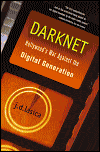Originally
published on Monday, July 11, 2005 in The Miami Herald
The gatekeepers strive to stifle innovation.
A
new wave of business opportunities is threatened by entrenched resistance
to digital innovation.
BY RICHARD PACHTER
rpachterATwordsonwords.com
Darknet:
Hollywood's War Against The Digital Generation. J.D. Lasica. Wiley.
308 pages.

.
If the future of America is not in manufacturing but in the creation
of intellectual property, we're in big trouble. Writer J.D. Lasica
reveals that access to the new creative digital domain is being
severely limited by the incumbent owners and controllers of popular
culture.
They have exerted their influence, Lasica contends -- and he's far
from alone in his beliefs -- in ways that subvert the original intentions
of the copyright laws. They also criminalize many of the methods
that allow the full range of artistic expression and creation afforded
by the digitalization of content.
A de facto alternative network, the ''Darknet'' of the book's title,
has emerged as a result of this attempt to control access. The parallel
-- and nonlegal -- network will continue to thrive unless and until
the gatekeepers embrace and profit from these new capabilities.
Historically, nearly every technological innovation in the entertainment
industry was initially resisted by the status quo, fearful their
revenue stream would be cut off.
FAILED ATTEMPTS
Sheet music publishers sued producers of piano rolls; musicians'
unions tried to ban radio broadcasts of recorded performances; film
studios resisted home videotaping. In each case, the innovation
soon emerged as a lucrative new business for the resisters.
The owners of TV networks and movie studios also feel compelled
to control distribution in previously unimaginable ways. Lasica
points out the laws they demanded of Congress that nullified traditional
terms and fair-use aspects of U.S. copyright are not in the public
interest, but in the studios'. Meanwhile, technology has opened
up a vast world of media possibilities, but implementation is limited
by the threat of litigation, says Lasica.
Equipment manufacturers, for example, are so fearful of Hollywood's
litigious wrath, users are prevented from making copies of their
own digital tapes -- not duplicates of feature films, but dubs of
their kid's graduation.
NO COINCIDENCE
Sony, once a leader in the field of consumer innovation (and plaintiff
in the case that established home videotaping rights) is now among
the biggest obstructors, according to Lasica. Surely it is no coincidence
that in the intervening years, Sony acquired film studio Columbia
Pictures, and the former CBS Music properties, Columbia and Epic
Records.
A FEDERAL OFFENSE
Under the terms of the Digital Millennium Copyright Act (DMCA),
Lasica writes, there is also no ''fair use'' whereby clips of commercial
films can be legally used. None whatsoever. Furthermore, if you
wish to print a copy of the U.S. Constitution from an encrypted
e-book, you are breaking the law. Despite the fact that the text
is in the public domain, circumventing the document's copy protection
by printing it is a federal offense!
Lasica is hardly an alarmist. He gives ample opportunity to former
movie industry lobbyist Jack Valenti and other like-minded advocates
of digital criminalization to express their concerns, while presenting
viewpoints of those who preach and operate within the new reality
of ''rip, mix and burn'' as well.
He also gives some sound suggestions for accommodations on all sides
that could unleash waves of innovation.
But he issues several ironic observations and warnings, including:
``In the end, this may be the greatest potential loss to society;
the service that never rolls out, the device that never gets invented;
the cultural advancement that never takes place -- all for fear
of a Hollywood lawsuit.''
Like business books? Join the club.
|

